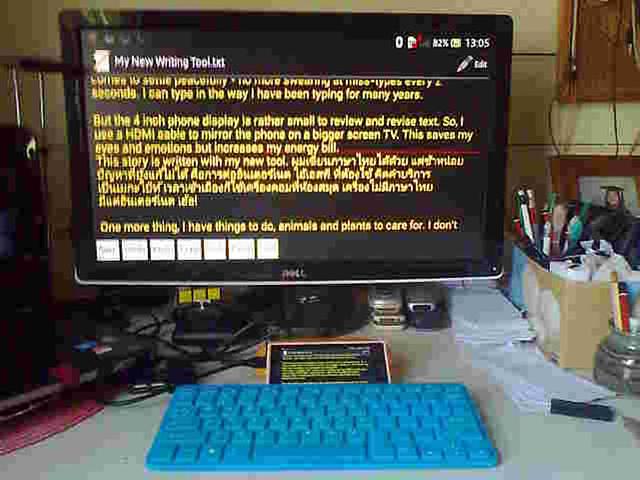เรียนรู้ จาก ⭕️ ถึง ❓️
preample
After a couple weeks of surfing the Net for info to build a model of Thailand [real] education system, I have found many disturbing facts and trends that complicate and procrastinate betterment of the system.

[The picture shows a setup or a model that serve as a workstation computer system. It is used to investigate a future device --a pocket computer. So far, I have learned most mobile phones can serve as a computer (but ‘I’ need bigger screen to see, bigger keyboard to type) for most users (reading, writing, and arithmetic --the 3 R's or in a modern terms ‘Look and Listen’, ‘Record and Paint’, Calculate). Mobile phone is an adequate tool for learning. But learning experience compare to paper, pencils, books,…? ]
By ‘model’ I mean, a simplified system (of interconnected simplified [model of] ‘components’ or ‘parts’) with a set of ‘controls’ (so that when a control [knob or button or …] is applied, the system changes its state or mode or speed or … (works in a different way with the same assembled parts). If this model is good then we can investigate improvement of the system through ‘control setting’ (system configuration) and improvement of parts (update and/or upgrade).
To build a ‘good’ model, we need to observe, question and derive clear understanding (--in physical form 'clear definition' of input, things/parts, processes, and output for ‘events’ (--in simple term ‘what happen when I do this’). We need to record (memorize) ‘things’ accurately and timely and make our record ready and available when we need it.
What happens when we operate a system but the system (or any of its parts) fail to record and/or report ‘correct’ facts, values (of measurements),… at the right time? We can clearly see that we cannot operate the system (any machine) continuously this way. The best we can do is (on again off again) ‘intermittently'. It is clear that possibilities of system improvement are severe eroded.
[It is with much regret that I found most government websites are ‘incomplete’ (many control buttons and selectors don't work), ‘out of date’ (old and not updated to current situation), ‘inaccurate’ (cannot be trusted) and ‘inconsistent’ (cannot be use in making decisions). This is similar to a person with poor memory and/or data processing abilities. We cannot improve until we have improved memory and thinking. Organizations and systems need much more good memory and thinking capacity to perform well and continuously in the same way.]
Findings
How do we learn --from zero?
(for English learners – from zero = from scratch, from nothing, from the ground [up], from the bottom)
Before we can build a model (form a picture of the system looks like and works like, we need to find facts about it. We have been looking at Thailand education system in our series of ปรับเปลี่ยน พัฒนา ปฏิรูป * and a good number of government and ‘education’ websites to clarify our thinking about the system and its parts. I try to use zero-based thinking approach to avoid ‘biases’ in my finding and writing.
What is the importance of zero-knowledge proof?
The idea behind zero-knowledge proof is that a user can prove to another user that they know an absolute value without actually revealing any other or extra information. The completeness property notes that the transaction is verified, and the prover is permitted for processing the transaction ahead.
--Zero-knowledge: if the statement is true, no verifier learns anything other than the fact that the statement is true. In other words, just knowing the statement (not the secret) is sufficient to imagine a scenario showing that the prover knows the secret.
Inquiry-based learning is a learning and teaching approach that emphasizes students' questions, ideas and observations. Instructors actively encourage students to share their thoughts and to respectfully challenge, test and redefine ideas.
The heart of Zero-Based Thinking lies in that deceptively simple question. It seems simple — but indeed it is very, very difficult to remove what we know, to break the ties of experience that bind us conceptually, to the system we have inherited.
We can sum up ‘learning’ as:
The road to Zero-Based Thinking begins with look and listen, then question, then test, then use.
However, there are infrastructure or subtle requirements that we often miss. Like ‘language’, fact/fake, memory, link/connection, vision/imagine (calculate the future events) and communication. These are background necessities for learning and for learners to master (use as will). All of us are born with zero knowledge but with sensory organs and memory so we can learn and better our abilities. We are in a way a model to investigate ‘learning’ and more the learning system – the education system at large.
[This post (due to time) will be updated in the coming days, to include more notes and findings.]
ความเห็น (0)
ไม่มีความเห็น